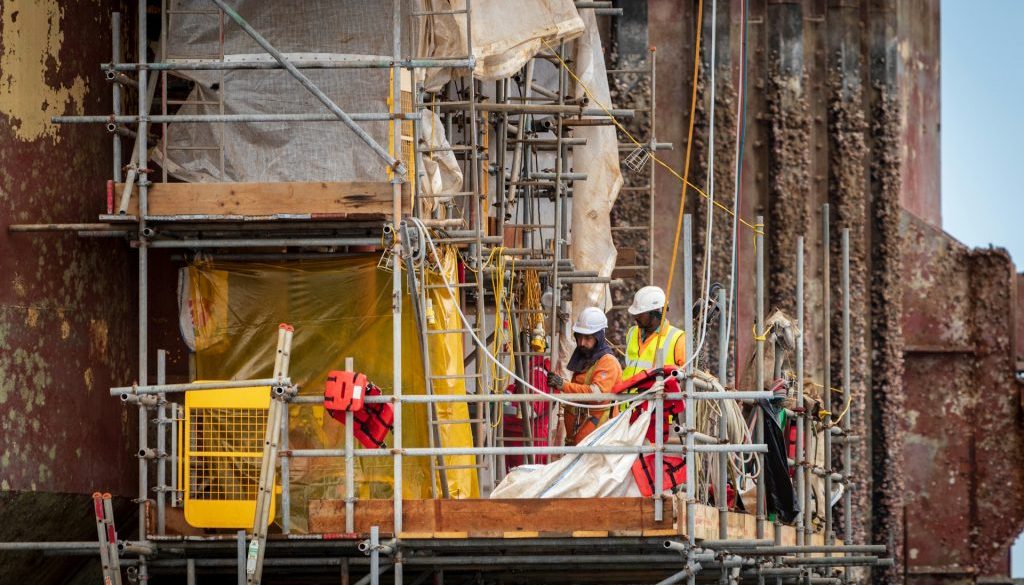Construction projects, whether large-scale developments or small home renovations, inevitably generate a significant amount of waste. For contractors, developers, and homeowners alike, it’s essential to understand the types of construction waste, the potential hazards they pose, and the best practices for their responsible disposal.
Ensuring efficient and eco-friendly waste management helps maintain a safe work environment, reduces the environmental footprint of your project, and contributes to a more sustainable construction industry. Enviro Skip Hire, a family-run skip hire and aggregate company servicing Staffordshire, is dedicated to providing reliable and environmentally-conscious waste management solutions for clients in the construction sector.
In this blog post, we will explore the various types of construction waste, discussing their hazards and the appropriate steps for safe and responsible disposal. By understanding the unique characteristics and challenges associated with different waste materials, you will be better equipped to implement environmentally-friendly waste management practices in your projects.
Additionally, we will discuss how partnering with a trusted skip hire and waste management provider such as Enviro Skip Hire can streamline your waste disposal process, help ensure compliance with relevant regulations, and contribute to the greater environmentally-conscious movement in the building and construction sector.
Types of Construction Waste and Potential Hazards
Construction waste can be broadly categorised into several types, each presenting unique hazards and disposal requirements. Understanding these categories will help you develop an efficient and effective waste management strategy for your projects.
1. Inert Waste: Inert waste is typically non-hazardous and includes materials such as bricks, concrete, tiles, and glass. Although this type of waste does not pose a direct threat to human health or the environment, it can still contribute to landfill overload if not managed and recycled responsibly.
2. Non-Inert Waste: Non-inert waste can be further sub-divided into hazardous and non-hazardous waste. Non-hazardous waste encompasses materials such as wood, metal, plastic, gypsum, and insulation. While these materials may not be inherently hazardous, improper disposal can lead to environmental issues and depletion of resources. Hazardous waste includes asbestos, painted wood, and lead-based items, which can pose significant health risks if not handled and disposed of correctly.
3. Organic Waste: Organic waste, such as food scraps and green waste, can be generated during construction projects and may require specific disposal methods to ensure minimal impact on the environment and human health.
Best Practices for Responsible Construction Waste Disposal
Adopting responsible waste disposal practices is essential in promoting a safer and more sustainable construction industry. Here are some best practices to consider when managing construction waste:
1. Waste Segregation: Sorting waste materials by type is crucial in ensuring proper disposal and recycling. Keeping separate skips or containers for different waste categories helps streamline the disposal process, mitigating potential harm to the environment and human health.
2. Recycling and Reusing: Whenever possible, seek to recycle and reuse construction waste to reduce the environmental impact of your projects. Many inert waste materials, such as concrete and bricks, can be repurposed or recycled into new products.
3. Hazardous Waste Management: Properly manage hazardous waste materials by utilising specialist waste disposal services to prevent harm to human health and the environment. Engaging a licensed and reputable waste management company, like Enviro Skip Hire, will ensure regulatory compliance and safe disposal of hazardous waste.
4. Employing a Waste Management Plan: Develop a comprehensive waste management plan for your project, outlining waste disposal and recycling procedures, designating responsible parties, and adhering to relevant regulations and guidelines.
Compliance with Waste Disposal Regulations
Strict regulations govern the disposal of construction waste, ensuring responsible practices that minimise harm to the environment and human health. Familiarising yourself with these regulations and compliance requirements is essential in maintaining responsible waste management for your projects.
1. Waste Duty of Care: In the UK, anyone who generates, handles, or disposes of waste has a legal duty of care to ensure proper management and disposal. This includes preventing harm to human health or the environment, working with authorised waste carriers, and maintaining accurate waste transfer notes.
2. Hazardous Waste Regulations: When handling hazardous waste, you must adhere to the Hazardous Waste Regulations, which stipulate specific requirements for the classification, storage, transportation, and disposal of hazardous materials.
3. Permits and Licences: Depending on the type and scale of your construction waste disposal, you may require permits or licences from local authorities or the Environment Agency, such as permits for waste disposal sites or hazardous waste consignment notes.
Partnering with Enviro Skip Hire for Construction Waste Management
Working with a trusted skip hire and waste management service provider like Enviro Skip Hire is invaluable in ensuring efficient and responsible construction waste disposal for your projects. Whether you are a contractor, homeowner, or developer, Enviro Skip Hire offers numerous advantages:
1. Wide Range of Skip Sizes: Enviro Skip Hire provides an extensive range of skip sizes suitable for various waste types and quantities, simplifying your waste management process.
2. Reliable and Expert Service: With a commitment to customer satisfaction, the team at Enviro Skip Hire delivers reliable and knowledgeable waste management services tailored to your project’s specific needs.
3. Eco-friendly Solutions: As a company focused on sustainability, Enviro Skip Hire ensures responsible waste disposal and recycling, minimising your project’s environmental impact.
Final Thoughts
Efficient and responsible construction waste management minimises potential hazards, promotes a safe work environment, and contributes to a sustainable construction industry. Understanding the different types of construction waste, their risks, and the appropriate disposal practices ensures your project’s compliance with relevant regulations and minimises its environmental footprint.
By partnering with a reputable skip hire and waste management company like Enviro Skip Hire, you can streamline your waste management process, knowing that your project adheres to best practices in responsible waste disposal.
Choose Enviro Skip Hire for your construction waste management needs, and join the movement towards a cleaner, safer, and more sustainable construction industry. Contact us today to hire a skip in Holmes Chapel and nearby areas!




